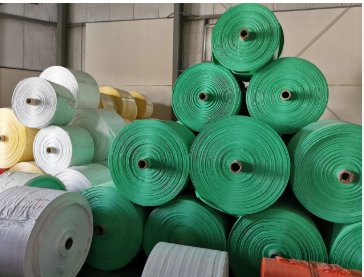
The need for sustainable packaging is greater than ever as industries and consumers seek eco-friendly solutions to reduce their environmental impact. Among the many packaging options available, PP Woven Bags have emerged as a durable and versatile choice. Made from polypropylene fabric, these bags are commonly used across industries such as agriculture, construction, and retail. But what makes them stand out in the realm of sustainability?
In this blog, we will explore the environmental impact of PP woven bags, their role in sustainable packaging, and why they are an eco-conscious choice for businesses and consumers alike.
What is Polypropylene Fabric?
Polypropylene fabric is a thermoplastic polymer widely used in the production of woven and non-woven products. Polypropylene is known for its strength, lightweight properties, and resistance to moisture and chemicals. When woven into fabric, it forms the foundation of PP Woven Bags, a highly durable and reusable packaging solution.
Polypropylene fabric is recyclable, adding to its appeal as a sustainable material. Its production requires less energy compared to other plastics, making it a relatively eco-friendly choice for industries seeking to minimize their carbon footprint.
Why PP Woven Bags are a Sustainable Choice
1. Reusability and Durability
PP woven bags are designed to be reusable. Their strength and durability mean they can be used multiple times without losing their functionality. Unlike single-use plastic bags, which contribute significantly to waste, PP woven bags offer a long lifespan, reducing the need for frequent replacements.
- Example: Farmers often reuse PP woven bags to transport grains or seeds over multiple seasons.
2. Recyclability
Polypropylene fabric is 100% recyclable. After its lifecycle ends, PP woven bags can be processed and repurposed into new products, such as outdoor furniture, car parts, or even new packaging materials. This recycling potential significantly reduces waste and environmental impact.
- Impact: Recycling helps reduce plastic pollution and conserves resources used in the production of virgin polypropylene.
3. Lower Carbon Footprint
The production of polypropylene requires less energy compared to other plastics. Additionally, the lightweight nature of PP woven bags reduces transportation emissions, as more products can be shipped using less fuel.
- Example: A company using PP woven bags for bulk transport may lower its overall shipping weight, reducing fuel consumption.
4. Reduced Food Waste
In agriculture, PP woven bags help preserve the quality of stored products by protecting them from moisture, pests, and external contaminants. This extends the shelf life of goods, reducing food spoilage and waste.
- Example: Grains stored in moisture-resistant PP woven bags remain fresh and usable for longer periods.
5. Versatility Across Industries
PP woven bags can be used for various applications, minimizing the need for specialized single-use packaging materials. Their adaptability ensures that one type of bag can serve multiple purposes, reducing waste generated by diverse packaging needs.
The Environmental Impact of PP Woven Bags
While PP woven bags are more sustainable than many alternatives, their environmental impact depends on how they are used and disposed of. Here are key considerations:
1. Production and Energy Use
The production of polypropylene fabric involves petrochemical processes, which contribute to greenhouse gas emissions. However, the energy required is significantly lower compared to other plastics, making polypropylene a more efficient choice.
2. Longevity vs. Waste
The extended lifespan of PP woven bags reduces the frequency of replacement and waste generation. However, improper disposal, such as incineration or landfilling, can contribute to environmental harm.
- Solution: Promote recycling and proper waste management practices to maximize the environmental benefits of PP woven bags.
3. Microplastic Concerns
Like all plastics, polypropylene can break down into microplastics if not properly managed. These tiny particles can enter ecosystems and pose risks to wildlife and human health.
- Solution: Encourage reusability and recycling to minimize environmental contamination.
Comparing PP Woven Bags to Other Packaging Materials
| Feature | PP Woven Bags | Single-Use Plastic Bags | Paper Bags |
|---|---|---|---|
| Durability | High | Low | Moderate |
| Reusability | Yes | No | Limited |
| Moisture Resistance | Excellent | Moderate | Poor |
| Recyclability | Yes | Limited | Yes |
| Environmental Impact | Lower with recycling | High | Moderate (deforestation) |
PP woven bags outperform single-use plastics and paper bags in terms of reusability, durability, and recyclability. They strike a balance between functionality and sustainability, making them a preferred option for environmentally conscious businesses.
Applications of PP Woven Bags in Sustainable Packaging
- Agriculture: Storing grains, seeds, and fertilizers with moisture-resistant and reusable bags.
- Construction: Transporting sand, cement, and other bulk materials securely.
- Retail: Packaging consumer goods with customizable designs for branding.
- Recycling Programs: Collecting and transporting recyclable materials efficiently.
Best Practices for Using PP Woven Bags Sustainably
- Promote Reusability: Use PP woven bags multiple times to reduce waste and maximize their lifespan.
- Encourage Recycling: Educate consumers and businesses about recycling programs for polypropylene products.
- Choose Recyclable Options: Opt for recyclable PP woven bags whenever possible.
- Proper Disposal: Avoid incineration or landfilling. Dispose of bags responsibly to minimize environmental impact.
Conclusion
PP woven bags, made from polypropylene fabric, are an excellent example of sustainable packaging in action. Their durability, reusability, and recyclability make them a smarter choice compared to single-use plastics and other traditional materials. By using PP woven bags responsibly and promoting proper recycling, industries can significantly reduce their environmental footprint.
As businesses and consumers prioritize eco-friendly practices, PP woven bags offer a practical solution that aligns with the goals of sustainability and environmental responsibility. Whether you’re in agriculture, construction, or retail, choosing PP woven bags is a step toward a greener future.






Leave a Reply